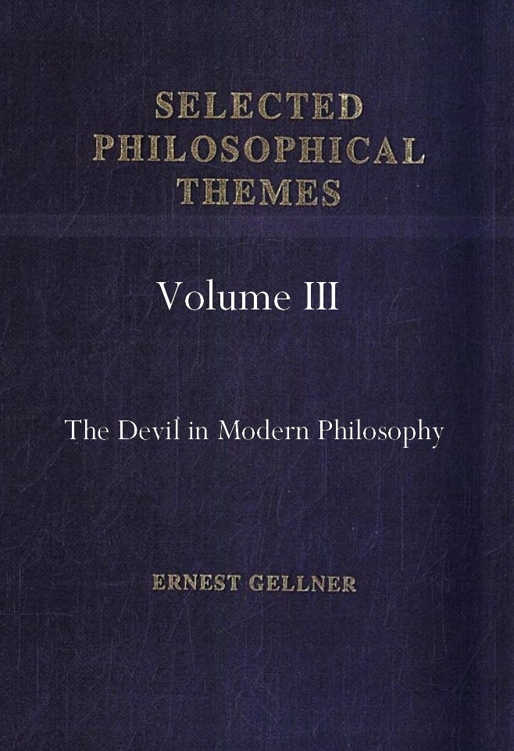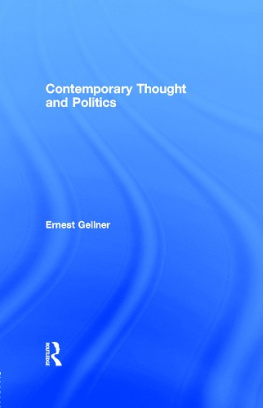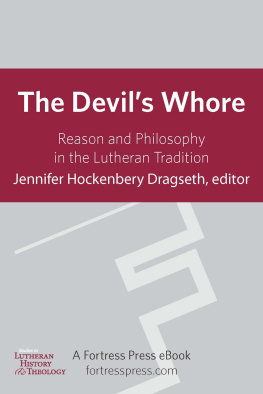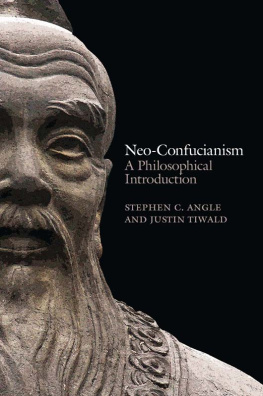Ernest Gellner - The Devil in Modern Philosophy (Selected Philosophical Themes)
Here you can read online Ernest Gellner - The Devil in Modern Philosophy (Selected Philosophical Themes) full text of the book (entire story) in english for free. Download pdf and epub, get meaning, cover and reviews about this ebook. year: 2003, publisher: Routledge, genre: Religion. Description of the work, (preface) as well as reviews are available. Best literature library LitArk.com created for fans of good reading and offers a wide selection of genres:
Romance novel
Science fiction
Adventure
Detective
Science
History
Home and family
Prose
Art
Politics
Computer
Non-fiction
Religion
Business
Children
Humor
Choose a favorite category and find really read worthwhile books. Enjoy immersion in the world of imagination, feel the emotions of the characters or learn something new for yourself, make an fascinating discovery.
- Book:The Devil in Modern Philosophy (Selected Philosophical Themes)
- Author:
- Publisher:Routledge
- Genre:
- Year:2003
- Rating:4 / 5
- Favourites:Add to favourites
- Your mark:
- 80
- 1
- 2
- 3
- 4
- 5
The Devil in Modern Philosophy (Selected Philosophical Themes): summary, description and annotation
We offer to read an annotation, description, summary or preface (depends on what the author of the book "The Devil in Modern Philosophy (Selected Philosophical Themes)" wrote himself). If you haven't found the necessary information about the book — write in the comments, we will try to find it.
Ernest Gellner: author's other books
Who wrote The Devil in Modern Philosophy (Selected Philosophical Themes)? Find out the surname, the name of the author of the book and a list of all author's works by series.
The Devil in Modern Philosophy (Selected Philosophical Themes) — read online for free the complete book (whole text) full work
Below is the text of the book, divided by pages. System saving the place of the last page read, allows you to conveniently read the book "The Devil in Modern Philosophy (Selected Philosophical Themes)" online for free, without having to search again every time where you left off. Put a bookmark, and you can go to the page where you finished reading at any time.
Font size:
Interval:
Bookmark:


VOLUME I Cause and Meaning in the Social Sciences
VOLUME II Contemporary Thought and Politics
VOLUME III The Devil in Modern Philosophy
SELECTE D
Volume III

LONDON AND NEW YOR K
First published 1974 by Routledge & Kegan Paul Ltd .
This edition published 200 by Routledg e 11 New Fetter Lane, London EC4P 4E E
Simultaneously published in the USA and Canad a by Routledg e 29 West 35th Street, New York, NY 1000
Routledge is an imprint of the Taylor & Francis Group
This edition published in the Taylor & Francis e-Library, 2005.
To purchase your own copy of this or any of Taylor & Francis or Routledges collection of thousands of eBooks please go to www.eBookstore.tandf.co.uk.
1974 Ernest Gellner
All rights reserved. No part of this book may be reprinted or reproduced or utilised in any form or by any electronic, mechanical, or other means, now known or hereafter invented, including photocopying and recording, or in any information storage or retrieval system, without permission in writing from the publishers.
British Library Cataloguing in Publication Data
A catalogue record for this book is available from the British Library
Library of Congress Cataloging in Publication Data
ISBN 0-203-01135-X Master e-book ISB N
ISBN 0-415-30295-1 (set ) ISBN 0-415-30298-6 (volume III )
Preface vii Acknowledgments ix
Part one Philosophy in general 1 The devil in modern philosophy 2 The crisis in the humanities and the mainstream of philosophy 3 Reflections on philosophy, especially in America 4 On being wrong 5 Is belief really necessary?
Part two On ethics 6 Maxims 7 Ethics and logic 8 Knowing how and validity 9 Morality and je ne sais quoi concepts
Part three Some ancestors 10 French eighteenth-century materialism
Part five Psychologists and others 16 The ascent of life 17 Mans picture of his world 18 On Freud and Reich 19 A genetic psychologists confessions 20 Eysenck: seeing emperors naked 21 On Chomsky
Sources Bibliography of Ernest Gellner Index of names Index of subjects
Prefac e
Ernest Gellner became a philosopher at a bad time: the dominant stream of philosophy in this countryOxford philosophy or linguistic philosophy was boring. Not only was it boringindeed it made a virtue of being boring it was pointless. Not only was it pointlessindeed it made a virtue of being pointlessit was self-serving. It even made a virtue of being self-serving. Anyone interested in Gellner and his philosophical ideas has to take these as premisses. Although Gellner has long since become a professionally qualified and published anthropologist; although he teaches in a sociology department and doubtless thinks of himself as something of a sociologist (perhaps an amateur but no dilettante); he remains above all a philosopher. The problems which preoccupy him, the things he has to say, are directly philosophical.
Coming of age at a time when philosophy was supposed to naturally have no problems, or at worst to have had them and to be engaged in making them go away (dissolve); at a time when philosophers were not supposed to be so vulgar as to have something to say about these problems (as opposed to something to do ); at such a time a genuine philosopher had to break out to breathe. This aspect of Gellners career, which brought him his original fame (for some, notoriety for others), the struggle for the freedom to philosophize, is hardly touched upon in this volume. We have rigorously excluded papers that were precursors of, or spin-offs from, his devastating act of breaking out, Words and Things (1959). Doubtless, when Ph.D. theses are written about the dispute over Oxford linguistic philosophy in Britain in the 1950s, these papers will be anthologizedby others. Our purpose, in collecting papers spread over twenty years of philosophical reflection, is to show how Gellners break-out was not just that. It led him to conclude that philosophical movements and fashions could not be adequately explained solely by philosophical means. This in turn led him into explorations of English intellectual culture, with a critical detachment and insight all the more remarkable because in this case the anthropologist is a member of the tribe.
Gellners systematic philosophy, if he has one, is also not expounded here. Again, the books Thought and Change (1965) and The Legitimation of Belief (1974) speak for themselves. What is to be found here are chapters on specific philosophical problems, and others on specific people with interesting philosophical ideas (not all of them philosophers). Despite wide differences on many matters, on one very profound point about philosophy Popper and Gellner are at one against Oxford linguistic philosophy: for both of them, philosophy is not a detached and free-floating activity for specialists; it cannot be separated out from peoples common-or-garden beliefs and day-to-day lives. Everyone has, however implicit, attitudes towards the basic philosophical quests of man, regarding his place in nature and society, regarding the meaning of life and of history. Philosophy is being critical about these questions, and proposing new solutions to them. Gellner is a philosopher who tries to contribute to this ambitious and magnificent tradition. And, in that tradition, each formulation, each statement, each view, is just another approximation, another speech in the continuing dialogue. Appropriately enough, the volume ends with the authors homage to another ambitious thinker, Noam Chomsky, in whom he senses a similar quest and to whom he looks hopefully for further enlightenment.
I.C.J.
J.A.
Acknowledgment s
The editors met Ernest Gellner in the 1950s at the London School of Economics when they were students, whom he treated as colleagues. Their appreciation of his work has grown since then, and they were glad to receive permission to edit his work. The editors wish to thank the publishers and editors of the different papers here republished. They take joint and equal responsibility for the selection, arrangement, and preface. Most of the technical work in preparing the volume for the press and seeing it through to publication was done by Jarvie, who wishes to thank his research assistant, Mr Michael Burchak. Agassi takes the blame for the flamboyant subject index.
York University, Toronto I.C.J.
Boston University and Tel Aviv University J.A.
Part on e Philosophy in genera l
Chapter The devil in modern philosoph y
Modern philosophy, from Descartes onwards and including the present generation of philosophers, can be defined as belief in the devil. What gives post-Cartesian philosophy unity is the daemon. Descartes invented him, but all the others believe in him.
Font size:
Interval:
Bookmark:
Similar books «The Devil in Modern Philosophy (Selected Philosophical Themes)»
Look at similar books to The Devil in Modern Philosophy (Selected Philosophical Themes). We have selected literature similar in name and meaning in the hope of providing readers with more options to find new, interesting, not yet read works.
Discussion, reviews of the book The Devil in Modern Philosophy (Selected Philosophical Themes) and just readers' own opinions. Leave your comments, write what you think about the work, its meaning or the main characters. Specify what exactly you liked and what you didn't like, and why you think so.










